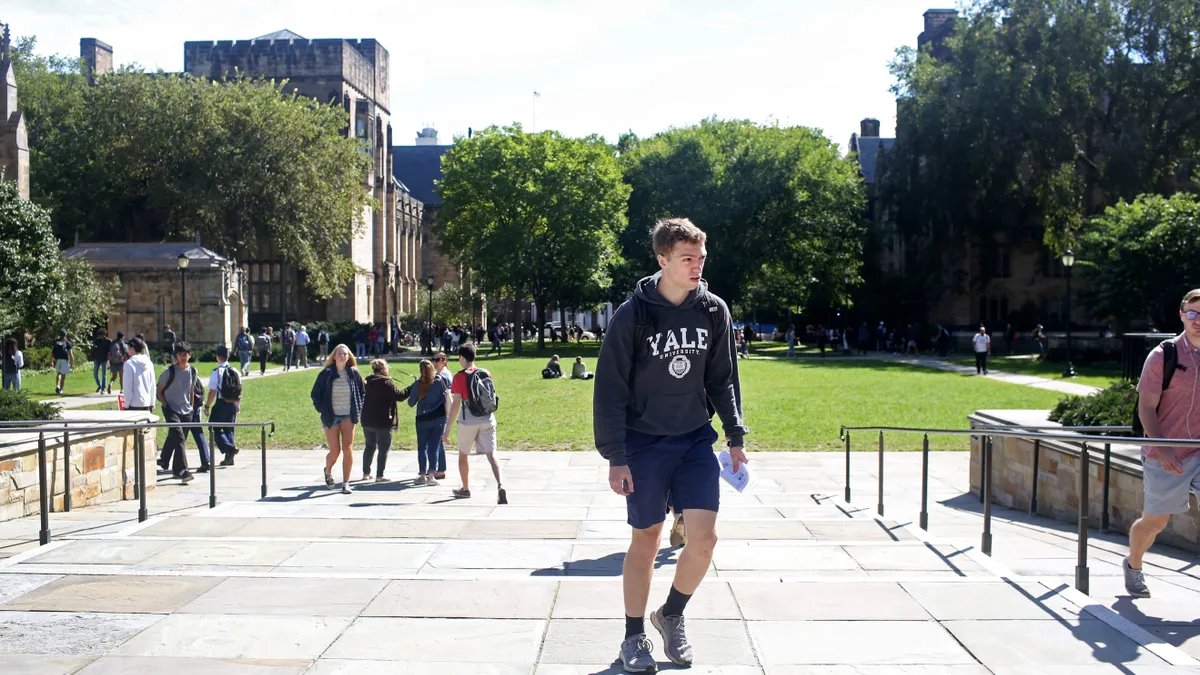Dive Brief:
- State lawmakers in Connecticut have proposed a bill banning legacy admissions preferences for public and private colleges, matching a national movement to remove barriers for underrepresented students in U.S. higher education.
- Colleges in the state, including the University of Connecticut and Yale University, oppose the measure, saying policymakers shouldn't dictate admissions decisions.
- Federal legislators have also introduced a bill to end policies that give relatives of alumni preference in admissions. It would apply to colleges that receive federal money — covering nearly all colleges across the country, as most accept Title IV financial aid.
Dive Insight:
A racial reckoning in the country and the coronavirus pandemic spotlighted roadblocks historically disadvantaged students endure as they seek to enroll in postsecondary education.
Vast swaths of colleges are no longer mandating SAT or ACT scores for admissions amid the pandemic. The tests' providers say entrance exams are ways for underrepresented students to stand out in the admissions process, but their opponents argue they favor wealthy applicants who can afford exhaustive tutoring.
Legacy admissions similarly box out underrepresented students, critics argue. Such practices date to the 1920s, and they have racist links, as elite institutions enacted them to limit Jewish and other immigrant students' enrollment.
Attention turned further to legacy admissions last fall when Amherst College, a highly selective Massachusetts liberal arts institution, abandoned the practice, citing a desire to open its doors to a more diverse student pool.
Also last year, Colorado's Democratic governor signed a bill blocking legacy preferences at public colleges.
Connecticut could be one of the next states to block legacy admissions if the new legislation passes. It would be effective July 1.
But the bill faces mounting criticism from the state's colleges.
University of Connecticut's vice president for enrollment planning and management, Nathan Fuerst, said in a written testimony against the bill that it would likely introduce a "slippery slope" of more state-level admissions restrictions, "making institutions subject to the prevailing opinion of elected bodies day-to-day."
"The passage of this bill might actually undercut our ability to successfully defend our admissions processes," Fuerst wrote.
The university does not factor in legacy status in admissions, Fuerst said. Its most recent Common Data Set states the university considers alumni relations, but this was in error and should be corrected soon, said university spokesperson Stephanie Reitz.
Yale's dean of admissions, Jeremiah Quinlan, said in a statement the university is skeptical a ban on legacy status would improve representation of low-income, first-generation and underrepresented students.
Quinlan detailed how the Ivy League institution instead helps low-income students through its need-blind policy, in which the university does not consider a family's ability to pay for college in admissions processes.
However, an institution saying it is need-blind does not mean students from lower-income brackets have equal opportunity to be admitted compared to their wealthier counterparts, according to Jon Boeckenstedt, vice provost for enrollment management at Oregon State University.
He also said in an email children of Yale alumni on average will come from wealthier families than other applicants.
"And, of course, at places where the freshman class is (either naturally or artificially) fixed, each legacy student who enrolls does, in fact, take a slot away from a student who might be more accomplished but not blessed by birth parents who went to an Ivy," Boeckenstedt said.
Two other private institutions in Connecticut, Fairfield University and Sacred Heart University, also disagree with government intervention in admissions decisions, administrators said in statements.
A more effective solution to bolstering student diversity would be investment in need-based aid, said Sacred Heart's senior vice president for enrollment, student affairs and athletics, Jim Barquinero.
The university is proud that it's become a tradition for families, though it does not rely on legacy status as a sole admissions factor, Barquinero said.
"In truth, if this bill passes, it threatens to have adverse effects on students who meet or exceed a school's admission standards but risk being rejected because their parents or siblings attended the same school, and admissions cannot appear to be in violation of the legacy law," Barquinero said.














